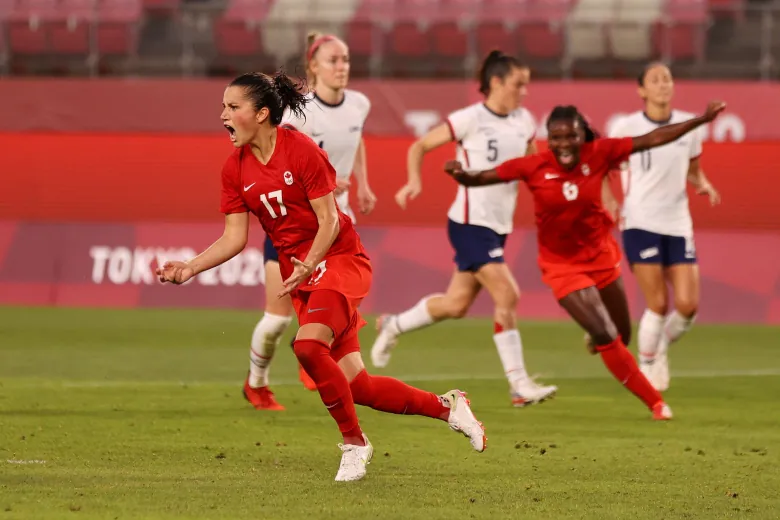Fresh off winning her second league championship with Chelsea, Jessie Fleming is riding high at the moment, but things could get a whole lot better for the Canadian midfielder.
Fleming came off the bench in the second half last weekend to help Chelsea secure a 4-2 win over Manchester United. The victory allowed the Blues to finish ahead of Arsenal by a single point in the final standings of England’s FA Women’s Super League and clinch a third consecutive league title on the last day of the 2021-22 season.
Fleming isn’t quite done, though. Sunday’s FA Cup final at 9:30 a.m. ET against Manchester City at London’s famous Wembley Stadium gives Chelsea a chance to win “the double” and repeat as winners of England’s top domestic cup competition.
For Fleming, a 24-year-old from London, Ont., adding a second FA Cup crown to her resume of remarkable achievements would be the icing on the cake of what has been a breakout season for the Olympic champion.
After playing four seasons of NCAA soccer at UCLA, Fleming made her professional debut with Chelsea in the summer of 2020. On one of the best clubs in the women’s game, Fleming struggled for playing time and opportunities in her rookie season, accumulating just 433 minutes over 14 league appearances (three as a starter) in 2020-21.
Completely different story
This season has been a completely different story for the Canadian. Fleming featured in 21 of Chelsea’s 22 FA WSL games, starting 11, while scoring six goals and tallying four assists. She was also named the league’s player of the month for November, and scored her first goal in the UEFA Champions League, firmly establishing herself as a key starter for the Blues in her second campaign at the club.
WATCH | Fleming scores in Chelsea’s Women’s Champions League romp:
Jessie Fleming of London, Ont., scored the sixth goal in Chelsea’s 7-0 win over Servette in UEFA Women’s Champions League group play.
Chelsea coach Emma Hayes showed a lot more trust in Fleming this season, giving her plenty of chances to prove herself on a club that features top international stars from around the world. More times than not, Fleming repaid that faith with her poised performances in the heart of Chelsea’s midfield engine room.
“You just look at the team [Hayes] has created at Chelsea. I’m surrounded by very, very good players every day in training, and in my development, that’s pushed me in terms of the standard that I want to be at, [which] is where someone like [Danish forward] Pernille Harder or [South Korean midfielder] Ji So-yun is,” Fleming explained.
It’s taken a while for Fleming to get to this point in her career. Much has been expected of the diminutive midfielder ever since she made her national team debut in late 2013 at the age of 15. Right from the get-go, her talent was obvious, and she continued to progress as she racked up more caps for Canada over the years. But as she continued to turn out for UCLA at the collegiate level, questions lingered as to whether she could take that next step and had more to give.
After a rough start at Chelsea, she has blossomed into an elite midfielder. Her game has matured. Whereas Fleming was once a player who complemented others, she has now become an important midfield orchestrator for both her club and country.
WATCH | Canadian women’s soccer team claims Celebration Tour victory over Nigeria:
Jessie Fleming opens up the scoring in the 51st minute as Canada goes on to defeat Nigeria 2-0 in the west coast series opener of the Women’s National Team Celebration Tour.
Fleming playing alongside top stars
Fleming has clearly benefited from playing alongside top internationals at Chelsea. It’s forced her to push herself harder to reach the same levels of her teammates on a squad that strives for excellence. Chelsea has become the dominant force in the English game over the last three years under Hayes, who was named the FIFA women’s coach of the year for 2021, and Fleming has benefited from her tutelage.
“[Hayes is] an extremely competitive individual and is always asking a lot out of her players, so she’s challenged me just in terms of my personal standards and what she expects from me on the pitch in both an attacking and defending sense,” Fleming offered.
She later added: “It definitely took me a little while to adapt. Getting used to the English league, and physicality and the speed of it, that was a big part [of it]; me needing to maybe take fewer touches on the ball at times, and make decisions a bit quicker in the attack, being more decisive. With a year of training in that environment and having some games under my belt I’ve been able to adapt to it better, and make more of an impact on the pitch more consistently.”

Outstanding form
Fleming’s outstanding form at club level didn’t escape the attention of Canadian team coach Bev Priestman earlier this year. When Christine Sinclair was unavailable for February’s Alan Clark Cup, a four-nation tournament held in England, Priestman turned to Fleming to serve as Canada’s captain for its opening game against the host nation. It marked the first time she captains Canada’s senior team.
It said a lot about how much Priestman thought of Fleming that she gave the Chelsea midfielder the captain’s armband even though there are several older and more experienced players on the Canadian squad.
“I’ve seen the hunger and desire, and she’s come into her own in the last year,” Priestman said.
It’s that same hunger and desire that Fleming has shown the entire season that Chelsea will be relying on in Sunday’s FA Cup final.



